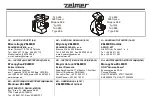
16
ENGLISH
Protections against other causes
Protection system is also designed for other causes
that could damage the tool and allows the tool to stop
automatically. Take all the following steps to clear the
causes, when the tool has been brought to a temporary
halt or stop in operation.
1. Turn the tool off, and then turn it on again to
restart.
2. Charge the battery(ies) or replace it/them with
recharged battery(ies).
3. Let the tool and battery(ies) cool down.
If no improvement can be found by restoring protection
system, then contact your local Makita Service Center.
Switch action
CAUTION:
Before installing the battery car
-
tridge into the tool, always check to see that the
slide switch actuates properly and returns to the
"OFF" position when the rear of the slide switch
is depressed.
CAUTION:
Switch can be locked in "ON" posi
-
tion for ease of operator comfort during extended
use. Apply caution when locking tool in "ON"
position and maintain firm grasp on tool.
To start the tool, press down the rear end of the slide
switch and then slide it toward the “I (ON)” position. For
continuous operation, press down the front end of the
slide switch to lock it.
►
Fig.3:
1.
Slide switch
To stop the tool, press down the rear end of the slide
switch so that it returns to the “O (OFF)” position.
►
Fig.4:
1.
Slide switch
Speed adjusting dial
The rotation speed of the tool can be changed by turn
-
ing the speed adjusting dial. The table below shows
the number on the dial and the corresponding rotation
speed.
►
Fig.5:
1.
Speed adjusting dial
Number
Speed
1
3,000 min
-1
2
4,500 min
-1
3
6,000 min
-1
4
7,500 min
-1
5
8,500 min
-1
NOTICE:
If the tool is operated continuously at
low speed for a long time, the motor will get over
-
loaded, resulting in tool malfunction.
NOTICE:
The speed adjusting dial can be turned
only as far as 5 and back to 1. Do not force it past
5 or 1, or the speed adjusting function may no
longer work.
Electric brake
Electric brake is activated after the tool is switched off.
The brake does not work when the power supply is shut
down, such as the battery is removed accidentally, with
the switch still on.
If the tool consistently fails to quickly stop after turning
off the switch, have the tool serviced at a Makita Service
Center.
Electronic function
Accidental re-start preventive function
When installing the battery cartridge while the switch is
ON, the tool does not start.
To start the tool, turn off the switch, and turn it on again.
Active Feedback sensing Technology
The tool electronically detects situations where the
wheel or accessory may be at risk to be bound. In the
situation, the tool is automatically shut off to prevent
further rotation of the spindle (it does not prevent
kickback).
To restart the tool, switch off the tool first, remove the
cause of sudden drop in the rotation speed, and then
turn the tool on.
Soft start feature
Soft start feature reduces starting reaction.
ASSEMBLY
CAUTION:
Always be sure that the tool is
switched off and the battery cartridge is removed
before adjusting or checking function on the tool.
Installing side grip (handle)
CAUTION:
Always be sure that the side grip is
installed securely before operation.
Screw the side grip securely on the position of the tool
as shown in the figure.
►
Fig.6
Installing or removing wheel guard
WARNING:
When using a depressed center
wheel, flap disc or wire wheel brush, the wheel
guard must be fitted on the tool so that the
closed side of the guard always points toward the
operator.
WARNING:
Make sure that the wheel guard is
securely locked by the lock lever with one of the
holes on the wheel guard.
WARNING:
When using an abrasive cut-off
/ diamond wheel, be sure to use only the special
wheel guard designed for use with cut-off wheels.
Summary of Contents for GA039G
Page 2: ...2 2 3 1 1 Fig 1 1 2 Fig 2 1 Fig 3 1 Fig 4 1 Fig 5 Fig 6 ...
Page 3: ...3 3 2 1 Fig 7 2 B 1 A B Fig 8 2 1 A C C Fig 9 1 2 Fig 10 1 2 Fig 11 ...
Page 4: ...4 Fig 12 1 Fig 13 1 2 Fig 14 1 2 A B Fig 15 2 4 3 1 Fig 16 1 2 Fig 17 1 A B Fig 18 ...
Page 5: ...5 Fig 19 1 2 Fig 20 15 Fig 21 Fig 22 Fig 23 Fig 24 Fig 25 Fig 26 ...
Page 6: ...6 1 Fig 27 1 4 2 3 Fig 28 2 3 1 Fig 29 1 Fig 30 1 1 2 2 Fig 31 Fig 32 ...
Page 7: ...7 1 Fig 33 1 2 Fig 34 1 Fig 35 1 Fig 36 1 1 2 2 Fig 37 1 2 Fig 38 ...
Page 8: ...8 1 Fig 39 2 6 7 4 5 5 2 2 8 10 9 3 1 Fig 40 ...
Page 182: ...182 ...
Page 183: ...183 ...
















































